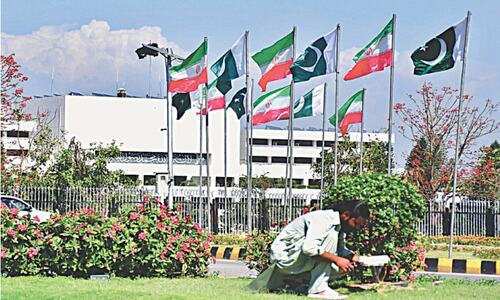ISLAMABAD: For the first time since November 2007, former president and military strongman retired Gen Pervez Musharraf has accepted direct responsibility for the imposition of emergency in the country, but has claimed that it was only done upon receiving advice that the security of the country had been imperilled by some actions of then chief justice Iftikhar Muhammad Chaudhry and some other members of the superior judiciary.
In a belated petition seeking review of the apex court’s landmark July 31, 2009, verdict, Gen Musharraf argued that then elected prime minister Shaukat Aziz had recommended taking extra-constitutional measures of proclaiming the emergency. A 14-judge bench headed by then chief justice Iftikhar Chaudhry had denounced successive military takeovers of the past four decades and their endorsement by the superior judiciary after declaring Gen Musharraf’s emergency order and most of the actions taken under it, including the appointment of over 100 superior court judges, as illegal and unconstitutional.
Legal observers are of the opinion that at least a 16-judge larger bench needs to be constituted to hear and overturn the July 31 verdict.
Gen Musharraf’s review petition was filed after a delay of over four years by Sharifuddin Pirzada, Mohammad Ibrahim Satti and Dr Khalid Ranjha.
It argued that the July 31 verdict should be set aside because both Mr Musharraf and Justice Iftikhar Chaudhry were at daggers drawn and rival because of a reference the former had instituted as then president against the latter on misuse of authority.
Gen Musharraf, however, expressed full confidence in the present Supreme Court headed by Chief Justice Tassaduq Hussain Jillani and all its judges and said he had faith of an impartial adjudication.
Through a separate application, the former military ruler requested the court to suspend the July 31 verdict as well as the proceedings before a special court constituted to try him under treason charges.
The review petition cited a letter of the then prime minister to the then president (Musharraf) about security of Pakistan in which direct allegations were levelled against Justice Chaudhry and some members of the judiciary which subsequently resulted in the proclamation of emergency.
It argued that since the emergency had been clamped on the alleged misdeeds of Justice Chaudhry, he should not have headed the 14-member bench. It violated principles of administration of justice in which the accused was condemned unheard. The petition also targeted the Nov 3, 2007, restraining order issued by a seven-judge bench headed by Justice Iftikhar Chaudhry and explained that Justice Rana Bhagwandas had signed the order on Nov 5, instead of Nov 3. Besides, the presence of Justice Ghulam Rabbani was also doubtful.
The petition disputed the restraining order by stating that it had been issued by the judges who already had ceased to hold their offices and by then a new chief justice, Abdul Hameed Dogar, had taken oath.
Moreover, till their restoration through an executive order of March 16, 2009, Justice Iftikhar Chaudhry and other judges had accepted and obeyed the 2008 Tikka Iqbal Khan case of validating the Nov 3 emergency on the same ground of accepting the Oct 12, 1999, military takeover as well as the Nov 3 emergency itself.
Justice Chaudhry waited till the superannuation of Justice Dogar that was due on March 22, 2009, and then assumed the office on March 24, 2009, which showed the judges fully accepted the tenure of Justice Dogar.
Moreover, the petition said, at the time of issuing the July 31 judgment, the holding in abeyance of the constitution was not considered to be a high treason and, therefore, the apex court in its binding short order of July 31 had not ordered the trial of Gen Musharraf under high treason.















































